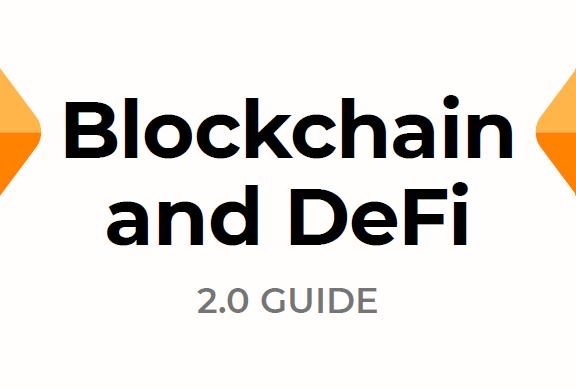Download the complete guide here.
This 2.0 Guide is intended to show the state of blockchain, DeFi, and cryptocurrency, as well as how they power new technologies and strategies in financial institutions across the U.S. It should also offer some perspective about why using AI-powered lending is necessary for credit unions to compete with fintech and big bank lenders in the next few years.
Sometimes it may seem like the terms blockchain and decentralized finance (DeFi) are used interchangeably. They’re not the same thing and it’s important to understand the difference between and the relationship between the two.
Blockchain is a technology platform upon which applications can be built. The most prevalent type of blockchain application is, of course, cryptocurrency like bitcoin. Blockchain-based digital identifications systems are also starting to gain momentum.
DeFi is simply another class of blockchain applications. The basic building blocks for DeFi are called smart contracts. As defined for us by IBM, “smart contracts are simply programs stored on a blockchain that run when predetermined conditions are met. They typically are used to automate the execution of an agreement so that all participants can be immediately certain of the outcome, without any intermediary’s involvement or time loss.”
In its purest form, DeFi wants to replace financial intermediaries (e.g., banks and credit unions) with technology. Think about how websites like Expedia and Travelocity all but eliminated travel agencies. DeFi wants to do the same thing to your credit union.
Before you get too scared, though, consider this: A few years ago, fintechs were going to replace banks and credit unions. Except they didn’t. Today fintechs are seeking partnerships with banks and credit unions because banks and credit unions have something fintechs don’t: access to living, breathing accountholders. In the same vein, DeFi technology will undoubtedly be adapted to serve as a tool for mainstream financial institutions and other entities. In fact, that’s already taking place, and the NCUA is pushing to find safe ways for credit unions participate. That said, these technologies are sure to cause some sort of disruption in the industry.
Download this and other guides here.
Blockchain and DeFi Trends and Statistics
The following trends and statistics paint a picture about why credit unions can (and should) evaluate blockchain and DeFi technology for what it can bring to both members and operations.
Trend 1: Blockchain is disrupting payments.
Blockchain-based payments have been criticized as being too slow. The question is: Slow compared to what?
On average, a blockchain transaction takes about 25 minutes to settle and under the right (wrong) circumstances can take hours. That hardly seems fast until you consider that an ACH transfer might take a couple of days to settle. With blockchain, that transaction is completely settled in 25 minutes.
Sure, FedNow and RTP are faster than that, but blockchain is also cheap. When you make a payment on a public blockchain, it’s a two-party transaction. Nobody collects any interchange. Nobody charges a processing fee. It’s essentially free.
Trend 2: Blockchain may save you big money… someday.
According to a joint report by Accenture and McLagan, blockchain has the potential to drive costs down in the middle and back office. Specifically, the study showed that blockchain could bring savings to the following areas:
- Financial reporting costs could be reduced by as much as 70% thanks to optimized data quality, transparency, and internal controls.
- Compliance costs could dip by 30% to 50% at the product level as the result of improved transparency and auditability.
- Increased efficiencies in centralized operations like Know-Your-Customer and client onboarding could reduce costs by 50%.
- Costs for various business operations like clearance, settlement and investigations could be cut by 50%.
Trend 3: Smart contracts and KYM (Know Your Member) reduce fraud and cybercrime.
Know Your Customer, or KYC, is both a regulatory requirement and good common sense. With the proliferation of cybercrime, it’s also increasingly important and increasingly difficult. Smart contracts have the potential to relieve some of that burden.
Smart contract-based KYC systems are already appearing on the market. Separate parts of the KYC process, such as identification and credit score verification, can be saved to and recalled from the blockchain. The integrity of those records is always intact. Other compliance requirements such as tax returns can be processed in real-time.
Blockchain-based member authentication solutions are also available. These are faster and more secure than “let us text you a code” solutions and are also portable by the member from one credit union to the next, assuming both credit unions are on the same platforms.
Trend 4: Cryptocurrency is still in a massive state of flux.
NYDIG closed up shop. Bitcoin is about to split, which means that mining rewards are about to get cut in half. There are international calls for a cryptocurrency regulatory framework. Ethereum transaction volume is plummeting as people prioritize staking over transactions. Elon Musk is making moves to turn X (formerly Twitter) into a financial app that supports crypto. Disreputable exchanges are disappearing left and right.
Although all that might appear chaotic, it’s actually the signs of dust settling. Major players like Blackrock are moving in, regulations are getting tighter, and the market is seeing less volatility. More changes are on the horizon, but crypto is safer now than it was before, and it’s getting safer still.
Evaluation Strategies
Not all blockchain-powered vendors use blockchain in the same way. Some allow members to exchange cryptocurrency; some reduce fraud and account takeover (ATO) attacks; some are working on ways to improve transaction speed and cost.
These are a few things you may want to consider when evaluating potential partners:
Crypto exchange
Can the solution allow members to buy, hold, sell, send, and receive cryptocurrency? Does it provide them the benefits of a crypto wallet?
Crypto rewards
Does the vendor provide cryptocurrency opportunities in the form of debit/credit card rewards? Can those rewards be used meaningfully?
Digital identity and KYM
Does the solution provide a fast, secure way to identify members? Does it reduce fraud or potential for ATO attacks?
Transaction improvement
Will the solution allow your credit union to transfer funds more quickly than traditional methods? Will it lower the cost?
Meets member demand
Does the solution address a known member need? Does it reduce member friction? Does it offer a new investment, payments, or wealth-building product for them? Will it keep them from turning to solutions outside of your credit union? Does it expose members to undue risk?
Reporting
Is the solution easy to report on? Does it play well with regulators? Does it offer any audit or compliance advantages?
Blockchain and DeFi Fintech Ratings, Part 1
Part 1 of our Blockchain and DeFi fintech ratings is about how each fintech in the guide works with credit unions. Do they compete? Do they sell services to credit unions at rates that maximize their profits but are hard on CU budgets? Do they share profits or marketing effort with credit unions?
We address these issues with our “Eat Your Lunch,” “Sell You Lunch,” and “Share Lunch With You” ratings in our downloadable PDF guides.
Download the Blockchain and DeFi 2.0 Guide here.
Blockchain and DeFi Fintech Ratings, Part 2
This section of our fintech ratings introduces blockchain and DeFi providers along with a brief description of what they do. We also attempt to rate each provider on two simple variables (outlined below).
Rating Methodology
CU 2.0’s rating methodology for our early guides is very simple. We measure the potential impact of working with each fintech on two variables: Impact on Credit Union (potential income, ROI, ease of partnership, etc.) and Member Experience (ease of use, banking experience, etc.).
0: N/A or no impact. Competes with or disintermediates credit unions; doesn’t offer relevant services.
1: Minimal impact. Minimal impact or ROI; limited or narrow use cases for credit unions or their members.
2: Moderate impact. May have modest ROI or limited growth potential; meets more than one major banking need.
3: Major impact. Has high ROI, growth, and memberization potential; may help both members and credit unions alike.
Our impact ratings don’t necessarily correlate to the quality of a given solution. Fintechs with higher potential impact scores aren’t automatically better, or a better fit, for your credit union and members.
Fintech Ratings
The following fintechs are listed alphabetically. These ratings correspond only to the two listed variables (Impact on Credit Union and Member Experience). These aren’t ranking of quality, nor are they recommendations—they’re meant only to serve as a starting point in your research to improve your credit union’s lending strategy.
Trusted solutions feature an asterisk by their names—these are fintechs that CU 2.0 has vetted personally.
| Fintech | Description | CU Impact | Member Impact |
| Bakkt | Bakkt offers crypto rewards and wallet to financial institutions and technology companies. | 1 | 1 |
| BankSocial | BankSocial offers a cryptocurrency exchange platform designed specifically for credit unions. | 2 | 1 |
| Credit Union Wealth Group | Credit Union Wealth Group offers fully managed crypto investing as part of its wealth services. | 1 | 1 |
| CryptoFi* | CryptoFi de-risks crypto for credit unions and brings in new members, expands access to digital assets, and offers merchant-funded crypto rewards. | 3 | 2 |
| Fiserv | Fiserv offers crypto rewards, wallet, and exchange through partnerships with Bakkt (and formerly NYDIG). Due to NYDIG’s exit of the CU market, Fiserv may not have a strong offer at this time. | 0? | 0? |
| Harness* | Harness features cryptocurrency on its roadmap as part of its member-funded rewards platform, but does not currently offer crypto capabilities. | 0 | 0 |
| i2c | i2c provides a general cryptocurrency program for financial institutions as well as management and support for it. | 1 | 2 |
| Jack Henry | Jack Henry offered cryptocurrency for credit unions through its partnership with NYDIG, but NYDIG’s CU exit may affect Jack Henry’s service at this time. | 0? | 0? |
| Kraken | Kraken is a highly secure cryptocurrency exchange and wallet that allows uses to stake their coins. | 0 | 1 |
| MemberPass | MemberPass from Bonifii offers a blockchain-based digital identity (KYM) solution for credit unions. | 1 | 1 |
| Next Edge Crypto* | Next Edge Crypto offers education and opportunities in the world of blockchain, crypto, and DeFi. | 1 | 1 |
| NYDIG | NYDIG recently shut down credit union services. For similar (and arguably better) providers, see CryptoFi or Unifimoney. | 0 | 0 |
| Robinhood | Robinhood offers a cryptocurrency exchange and wallet in addition to a growing suite of banking services. | 0 | 2 |
| Sequoir | Sequoir is a cryptocurrency exchange platform made specifically for financial institutions. | 2 | 1 |
| Unifimoney | Unifimoney is a digital brokerage for credit unions that allows members to buy and sell cryptocurrency. | 2 | 1 |
Please note that these ratings are in their early stages and will be updated as we include more data and more complex variables. The ratings are not definite—your credit union could see a different level of impact than listed in this guide.
Did we miss a fintech? Please let us know at info@cu-2.com
Recommendations
Choosing the right partners to leverage fintech lending capabilities and efficiencies will depend on your goals, budget, timeline, and other factors. CU 2.0 can help in the following ways:
- Join our Fintech Call Program. In quarterly 30-minute calls, we’ll discuss in depth new and innovative fintech solutions that fit your credit union’s needs. We can also help you review other solutions you’re looking at.
- Ask for an introduction. We maintain relationships with most or all of the vendors rated above. We would be happy to give you a warm introduction to any we can on the list.
- Book a consultation. CU 2.0 offers technology and fintech consultations and reviews to identify best-fit solutions for your credit union.




